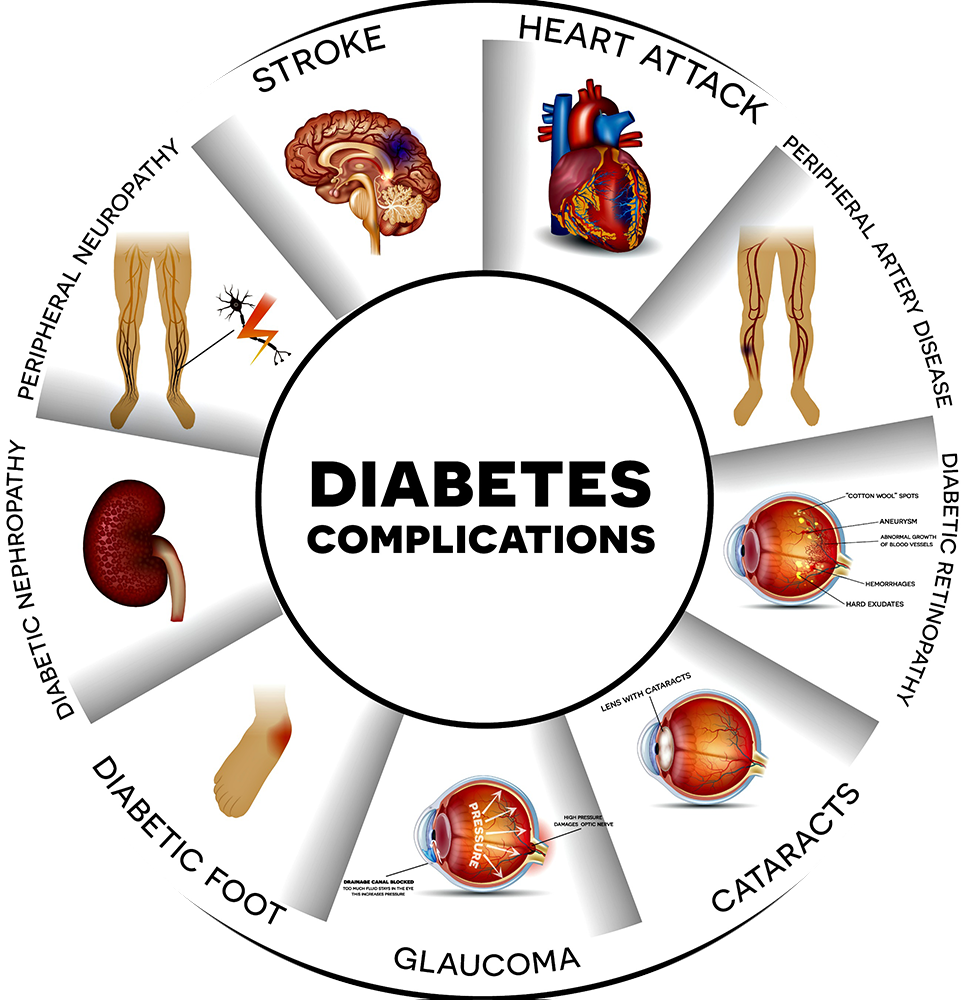Table of Contents[Hide][Show]
- LISTEN TO THE PODCAST
- CHAPTERS
- Why Blood Sugar Levels Are So Important
- What Are Healthy Blood Sugar Ranges?
- The Impact of High Blood Sugar on Your Body
- How Blood Sugar Affects Your Everyday Life
- The Benefits of Maintaining Healthy Blood Sugar Levels
- Practical Steps to Support Blood Sugar Control
- One Key Takeaway
- Transcript
Managing your blood sugar levels is one of the most important steps you can take for your health.
Whether you’re newly diagnosed with type 2 diabetes, living with prediabetes, or have been working on blood sugar control for years, understanding why blood sugar matters and how to maintain it in a healthy range is essential for your immediate and long-term well-being.
LISTEN TO THE PODCAST
CHAPTERS
1:17 Blood sugar is fundamental to our health
3:10 Why blood sugar matters
3:55 Healthy blood sugar levels in brief
7:30 Dangers of prolonged high blood sugar
13:14 Benefits of maintaining blood sugar stability
16:49 The key to healthy blood sugar and A1c
Support the podcast by leaving a 5-star rating and review on Apple, Spotify or our Website – Thank You!
Why Blood Sugar Levels Are So Important
Your blood sugar, or blood glucose, plays a central role in how your body functions. It provides energy for your brain, muscles, and cells, helping you think clearly, move efficiently, and stay energized throughout the day.
But here’s the key: your body is designed to function with blood sugar levels in a specific, healthy range. When blood sugar levels stray too high or too low, it can throw your body out of balance.
Consistently high blood sugar levels, also known as hyperglycemia, can lead to serious health issues over time.
It’s not just about avoiding complications; it’s about improving your quality of life—feeling better, staying energized, and living with confidence that your body is functioning at its best.
What Are Healthy Blood Sugar Ranges?
One key step to improving your health is knowing the blood sugar ranges that are considered healthy.
Here’s a quick guide to help you understand where your levels should be:
- Fasting Blood Sugar (first thing in the morning):
- Ideal: 70–99 mg/dL (4.0–6.0 mmol/L)
- Post-Meal Blood Sugar (two hours after eating):
- Ideal: Under 140 mg/dL (7.8 mmol/L)
- A1c Levels (average blood sugar over the past 2–3 months):
- Normal: Below 5.7% (6.0% in Canada, UK and Australia)
- Prediabetes: 5.7–6.4% (6.0–6.4% in Canada, UK and Australia)
- Type 2 Diabetes: 6.5% or higher
If you have prediabetes, your goal is to get back into the normal ranges. For type 2 diabetes, the journey may take longer, but aiming for the normal A1c range is ideal. However, lowering your A1c to below 7% is a great first milestone.
The Impact of High Blood Sugar on Your Body
High blood sugar isn’t just a number; it affects every system in your body.

Over time, elevated levels can damage your blood vessels, leading to the development of diabetes complications like:
- Heart Disease and Stroke: High blood sugar increases the risk of hardening and narrowing of the arteries.
- Eye Damage (Retinopathy): The tiny blood vessels in your eyes are particularly vulnerable, leading to vision problems or blindness.
- Nerve Damage (Neuropathy): Tingling, numbness, and even loss of sensation can result from damaged nerves.
- Kidney Damage: High blood sugar overworks the kidneys, potentially leading to kidney disease or kidney failure.
- Slow Healing and Infections: Poor circulation and weakened immunity can make wounds harder to heal and increase the risk of infections.
The good news? They’re largely preventable. By focusing on bringing your blood sugar back into a healthy range, you can protect your body and enjoy a healthier, more vibrant life.
How Blood Sugar Affects Your Everyday Life
Beyond the risk of complications, high blood sugar can make everyday life more challenging.
You might notice:
- Low Energy and Fatigue: Your body struggles to efficiently use glucose for energy.
- Brain Fog and Difficulty Concentrating: Your brain relies on glucose, and imbalances can affect mental clarity.
- Mood Swings: Blood sugar fluctuations can influence your emotions and cause irritability.
- Sleep Disruptions: High blood sugar can lead to restless sleep or nighttime waking.

The Benefits of Maintaining Healthy Blood Sugar Levels
When your blood sugar is within the ideal range, your body works more efficiently, and you feel better overall.
Here are just a few benefits of maintaining healthy blood sugar levels:
- Steady Energy Levels: No more mid-afternoon crashes or constant fatigue.
- Improved Focus and Clarity: Balanced blood sugar supports brain function.
- Reduced Inflammation: Lower blood sugar means less stress on your body.
- Better Nutrient Uptake: Your cells absorb nutrients more effectively, supporting repair and growth.
- Protection Against Complications: You lower your risk of long-term damage to your organs and nerves.
Maintaining healthy blood sugar isn’t just about the future—it’s about living your best life today.
Practical Steps to Support Blood Sugar Control
Managing blood sugar doesn’t have to be overwhelming. Here are some simple steps you can take today to make a positive impact:
- Balance Your Meals: Aim for meals that include protein, healthy fats, and non-starchy vegetables. These help stabilize blood sugar and reduce blood sugar spikes.
- Reduce Refined Carbs: Cut back on sugary foods, white bread, and other highly processed carbs. Replace them with nutrient-dense options like leafy greens, cauliflower rice, or small portions of berries.
- Stay Active: A short walk after meals can help lower blood sugar levels naturally. Aim for 10–15 minutes of movement after eating.
- Stay Hydrated: Drinking plenty of water helps your body process glucose more efficiently.
- Monitor Your Blood Sugar: Regularly checking your levels can help you see patterns and make informed decisions about your food and activity choices.
One Key Takeaway
If there’s one thing to remember, it’s this: small, consistent actions are what lead to meaningful, lasting changes in your blood sugar and overall health.
Start with just one step today—whether it’s balancing your next meal, going for a walk, or committing to testing your blood sugar more regularly. Every effort you make is an investment in your health and your future.
Transcript
Click Here To View
Dr Jedha, Host
Hello, Dr Jedha here and welcome to episode 60. I’m so glad you’re here today as we’re covering a topic that is very important to you, a topic that’s important to everyone in fact.
Today, we’re going back to basics to talk about something fundamental to our health: blood sugar. Whether you’ve been managing your blood sugar for years or you’re just beginning to learn how it affects your body, it’s always a good time to learn or to have a refresher or a reminder.
Understanding why blood sugar matters so much, and how keeping it in a healthy range can make a significant difference to your immediate and long term health. Understanding your numbers and why it matters can provide clarity, motivation and purpose, and reinforce the actions we take to look after ourselves. Our blood sugar is an incredibly important aspect of our health, more important than we realize.
Th thing is, I’ve seen people with high blood sugar in the 300s or living with high A1c levels at 9 or 10 and not doing anything about it. We don’t want that to be you and after we delve into today’s episode, you’ll completely understand why. Right now you may be unaware of the influence these high levels have on their health, but after listening today, that will certainly change.
If you’ve been doing okay with blood sugar or even feel you’re doing great, then use today as a refresher to reinforce your goals or as a reminder to acknowledge how far you’ve come.
Importantly, blood sugar isn’t just another number—it’s deeply connected to how we feel, how the body functions, and for our long-term health on so many levels. Today, we’ll explore the key reasons why blood sugar is so important and how better management can positively impact your energy, focus, and quality of life.
03:10
Let’s start by talking about why blood sugar matters. Our blood sugar levels or blood glucose levels – these are the same thing; they are meant to be in a certain range for optimal functioning of all the cells throughout our body. Having blood sugar levels in the ideal healthy range is like maintaining the perfect balance to keep all your systems running smoothly. Whereas when blood sugar levels stray too high, it can have a ripple effect on your health, a ripple effect with negative consequences.
The key point being, our body is designed to operate with blood sugar levels in an ideal healthy range.
03:55
So, what exactly is considered healthy when it comes to blood sugar levels?
This is a question many people ask, and it’s an important one. Blood sugar levels are typically measured in milligrams per deciliter (mg/dL) or mmol/l – depending where you live in the world. The ranges we aim for depend on whether the test is fasting, post-meal, or an average over time.
For most people, a fasting blood sugar level—taken first thing in the morning before eating—should ideally fall between 70 and 99 mg/dL, or 4.0 to 6.0 mmol/l. This range is the normal range and indicates that your body is effectively regulating blood sugar overnight while you’re not consuming food.
After meals, blood sugar levels naturally rise as your body processes the food you’ve eaten, this is the same for everyone so it’s normal for blood sugar levels to fluctuate. The key is staying in the ideal health ranges. Post-meal levels should ideally stay under 140 mg/dL or 7.8 mmol/l two hours after eating. This indicates that your body is efficiently clearing glucose from the bloodstream.
With prediabetes, your goal is to aim for these normal ranges for both fasting and post-meal levels. For type 2 diabetes, your goal is to aim for these normal ranges for both fasting and post-meal levels, though it can sometimes take longer in comparison to those with prediabetes. The point is though, these are the ideal healthy ranges for blood sugar levels.
The third measure, known as A1c or hemoglobin A1c, reflects your average blood sugar over the past two to three months. An A1c level below 5.7% is considered normal, while levels between 5.7% and 6.4% indicate prediabetes and 6.5% or above is T2diabetes. Or if you’re in the UK or Australia, an A1c below 6.0 is considered normal and the range is 6.0 to 6.4%. Yes, this is pretty confusing, as it should be the same numbers all over the world, but it isn’t. Ideally though, an A1c level below 5.7% is considered normal.
For prediabetes, you want to aim to get your A1c levels back in this healthy range, under 5.7%. For type 2 diabetes, your initial goal is under 7%, then under 6%, then aim for normal levels if you can.
Whether it’s fasting, post-meal or A1c levels, these benchmarks are critical in understanding where you stand and what steps might be needed to improve or maintain your blood sugar control.
We covered healthy blood sugar ranges and goals in detail back in episode 11, so if you need a deeper dive into this, please go back and listen to episode 11.
07:30
So what happens in your body when blood sugar levels stay too high for too long?
High blood sugar—also known as hyperglycemia—puts stress on your entire system, quite simply because our body is designed to have blood sugar levels within the ideal healthy range – that’s how our body functions at its best. And as we spoke about in episode 30, one of the most important things to consider, is that high blood sugar is what causes diabetes complications to develop.
Over time, high blood sugar can damage the lining of your blood vessels, and this is the primary reason why complications can arise in areas like the heart, kidneys, eyes, and nerves.
Some of the potential complications linked to prolonged high blood sugar are:
- Heart Disease and Stroke: Damage to blood vessels increases the risk of atherosclerosis—hardening and narrowing of the arteries—which can lead to heart attacks and strokes.
- Eye Damage, which is known as Retinopathy: The tiny blood vessels in your eyes are particularly vulnerable. High blood sugar can weaken or damage these vessels, leading to vision problems and, in severe cases, blindness.
- Nerve damage, which is known as Neuropathy: Often starting in the extremities like your hands and feet, this can cause tingling, numbness, pain, or even loss of sensation, which can make injuries harder to notice and treat.
- Kidney Damage, which is known as Nephropathy: Your kidneys filter waste from your blood, and elevated glucose levels can damage the filtering units, leading to chronic kidney disease or, in severe cases, kidney failure.
- Foot Ulcers and Amputations: Reduced blood flow and nerve damage increase the risk of ulcers or infections, which may not heal properly, sometimes leading to amputations.
As mentioned at the beginning of the episode, I’ve seen people with high blood sugar in the 300s or living with high A1c levels at 9 or 10 and not doing anything about it. This is the kind of situation where, if left unattended, complications will certainly develop over time and you would be putting yourself at significant risk if you don’t pay attention to getting your blood sugar lower. These complications don’t develop overnight, but they are real risks for anyone with poorly controlled blood sugar.
No, we don’t like to think of the negative consequences and I know this list of potential complications can sound daunting, but it’s important to emphasize that they are not inevitable. With consistent effort and the right strategies, you can significantly reduce or even eliminate these risks entirely. The risks of high blood sugar are real, but so is your ability to manage and lower them, with the goal of achieving or getting as close as possible to those ideal normal blood sugar ranges we mentioned earlier.
Beyond the risk of complications, high blood sugar also has a significant impact on how you feel day to day and how well your body functions.
When blood sugar is consistently elevated, it can disrupt your body’s delicate hormonal balance. This can lead to increased fatigue, difficulty concentrating, and even mood swings. Many people don’t realize that issues like brain fog, lack of energy or feeling ‘off’ emotionally can often be linked to blood sugar that isn’t stable.
Another major factor is its impact on your immune system. Chronic high blood sugar weakens the immune response, making it harder for your body to fight off infections or recover from illness. This is why people with poorly controlled blood sugar are at greater risk of infections, slow wound healing, and even more severe outcomes from illnesses like the flu.
On a broader scale, high blood sugar levels can also affect sleep quality. When your blood sugar fluctuates during the night, it can disrupt restful sleep, leaving you feeling groggy or less refreshed in the morning. Poor sleep, in turn, can worsen blood sugar control, creating a vicious cycle.
In essence, high blood sugar levels not only impact your long-term health but can also make it harder to enjoy life on a day-to-day levels. This is why managing blood sugar effectively isn’t just about avoiding complications—it’s about improving your quality of life right now and for the future.
13:14
Let’s talk about the incredible benefits of maintaining your blood sugar within a healthy range. These benefits extend beyond just avoiding complications—they affect how your body functions every day and how well it ages over time.
Balanced blood sugar helps improve your overall metabolism. Metabolism isn’t just about burning calories; it’s the entire process of how your body converts food into energy and utilizes it effectively. When blood sugar is well-managed, your metabolism works more efficiently, allowing your body to regulate energy levels, repair tissues, and perform essential functions without overburdening systems like your pancreas or liver.
Another key benefit is better nutrient uptake into your cells. Insulin, the hormone that helps regulate blood sugar, is responsible for delivering glucose and other nutrients into your cells where they’re used for energy and repair. When blood sugar is consistently high, your cells can become resistant to insulin, making it harder for them to absorb not only glucose but also vital nutrients like amino acids, potassium, and magnesium. By keeping blood sugar in a healthy range, you ensure your cells can efficiently absorb these nutrients, which helps your body function optimally and supports overall health.
In the short term, this translates to steady energy levels, reduced inflammation, and improved focus. You’re less likely to experience energy crashes or brain fog that can happen when blood sugar fluctuates wildly. Your body feels balanced, and you have the stamina to get through your day with greater ease.
In the long term, the benefits are even more profound. Better blood sugar control protects your brain, reducing the risk of cognitive decline and conditions like Alzheimer’s disease. It safeguards your heart and blood vessels, ensuring they stay strong and flexible. And it gives your body the tools it needs to maintain healthy organs, nerves, and skin, keeping you feeling vibrant and resilient as you age.
Blood sugar management is also one of the most powerful preventive health investments you can make. By maintaining stable blood sugar levels, you’re reducing stress on your body and giving it the opportunity to function at its best. You’re protecting against long-term complications like heart disease, nerve damage, and kidney issues, and you’re improving how your body processes food and absorbs nutrients—making every bite count.
Think of it this way: when your blood sugar is stable, your body doesn’t have to work overtime to balance energy, reduce inflammation, or repair damage. Instead, it can focus on thriving. There really are so many benefits to achieving and maintaining health blood sugar levels.
The effort you put into managing blood sugar today has ripple effects that touch every part of your body. It’s not just about numbers; it’s about building a solid foundation of health, the effects of which ripple long term throughout your life.
16:49
As we’ve spoken about a lot throughout various episodes of this podcast, nutrition is key to lowering blood sugar and A1c into the ideal healthy ranges, more important than anything else. Diet and nutrition are the most important part of your treatment. The most important part. If you can get your diet and nutrition right, you can completely change your blood sugar levels and your diabetes health overall.
By upgrading your diet and nutrition, you can:
- get your blood sugar and HbA1c levels back to normal
- lose weight if you need to
- Reduce your risk of nasty diabetes complications
- reduce or eliminate your need for medication
- Improve cholesterol and blood pressure
- Decrease inflammation
- Increase energy
- And much more
We’ve covered nutrition quite a bit in previous episodes and will certainly cover further aspects of nutrition in future episodes as well, so we’re not going to deep dive into that here, but just know: diet and nutrition are the most important part of your treatment. It is the one key thing that will help you achieve normal blood sugar levels.
Now, let’s shift the focus to you. Think about what you’ve learned or rediscovered today and consider how it applies to your own health. Are there small changes you could start making right now to move closer to your goals? Maybe it’s becoming more consistent with monitoring your blood sugar, or perhaps it’s listening to previous episodes of this podcast and experimenting with a meal that balances protein, healthy fats, and non-starchy vegetables. Or, if you’re one of our members, maybe this means using the health log to track your progress and reporting your progress in the monthly check ins so you stay accountable to your goals.
The important thing to consider, as we’ve covered today, is that achieving and maintaining healthy blood sugar levels is very important goal to work toward and an important aspect of health to maintain.
Our blood sugar levels are meant to be within a certain range. A normal range that our body considers optimal.
We’ve covered healthy blood sugar levels briefly today and if you need a full refresher on best blood sugar ranges, listen to episode 11.
The purpose of this message today was to provide a refresher about why blood sugar is so important.
In brief, when levels go higher than normal, the blood vessels throughout the body can get damaged. This can lead to nasty complications that no one likes to talk about, sometimes leading to irreversible or life-threatening complications: eye problems and blindness, foot ulcers and limb amputations, heart disease or heart attack and stroke, nerve damage leading to tingling or pain and loss of sensation, kidney damage leading to kidney disease – and the list goes on. It’s also important to your mental clarity, mental health, emotional wellbeing, hormonal health, and the list goes on.
Your efforts to achieve a healthy blood sugar range are important. Obtaining and maintaining better blood sugar control helps to reduce your risk of complications!
Plus, of course, obtaining and maintaining a healthy blood sugar range makes you feel a lot better too, and you certainly deserve to feel the best you can.
Use the information we’ve shared today to keep your health goals at the front-of-mind, to get back on track, to find motivation, to reinforce your purpose, or to aim for your best health.
Every effort you make is well worth it! After all, it’s an investment in YOU!
That’s all from me today, see you next week.
Dr Jedha, over and out.
Subscribe to Type 2 Diabetes Talk on: Apple | Spotify | Amazon Music | Audible | YouTube | Podcast Index | Player FM | and more…



Leave a Reply